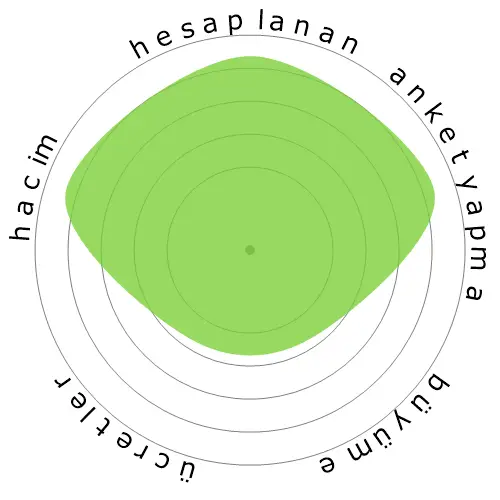Özel ve Mesleki / Teknik Eğitim Hariç Ortaokul Öğretmenleri




İnsanlar ayrıca inceledi
Hesaplanmış otomasyon riski
Minimum Risk (0-20%): Bu kategorideki meslekler genellikle karmaşık problem çözme, yaratıcılık, güçlü kişilerarası beceriler ve yüksek derecede manuel beceri gerektirdiği için otomatikleştirilme olasılığı düşüktür. Bu işler genellikle karmaşık el hareketleri ve hassas koordinasyon gerektirir, bu da makinelerin gerekli görevleri taklit etmesini zorlaştırır.
Bu puanın ne olduğu ve nasıl hesaplandığına dair daha fazla bilgi burada 'da mevcuttur.
Kullanıcı anketi
Ziyaretçilerimiz, bu mesleğin otomatikleşme şansının düşük olduğunu belirtmişlerdir. Bu değerlendirme, otomasyon risk seviyesinin hesaplanması ile daha da desteklenmektedir, bu da otomasyonun %16% olasılığını tahmin eder.
Otomasyonun riski hakkında ne düşünüyorsunuz?
Özel ve Mesleki / Teknik Eğitim Hariç Ortaokul Öğretmenleriın önümüzdeki 20 yıl içinde robotlar veya yapay zeka tarafından değiştirilme olasılığı nedir?
Duygu
Aşağıdaki grafik, anlamlı veriler sunmak için yeterli miktarda oy bulunduğunda eklenir. Bu görsel temsiller, kullanıcı anket sonuçlarını zaman içinde göstererek duygu eğilimlerine dair önemli bir gösterge sağlar.
Zaman içindeki duygu durumu (yıllık)
Büyüme
'Secondary School Teachers, Except Special and Career/Technical Education' iş açıklarının sayısının 2033 yılına kadar 0,6% azalması bekleniyor
Toplam istihdam ve tahmini iş açılışları
Güncellenmiş projeksiyonlar 09-2025 tarihinde teslim edilmelidir..
Ücretler
2023 yılında, 'Secondary School Teachers, Except Special and Career/Technical Education' için medyan yıllık ücret $65.220 idi, yani saat başına $31.
'Secondary School Teachers, Except Special and Career/Technical Education' ulusal medyan ücretin, $48.060 olduğu yerde, %35,7% daha yüksek bir ücret aldılar.
Zaman içindeki ücretler
Hacim
2023 itibariyle Amerika Birleşik Devletleri'nde 1.045.170 kişi 'Secondary School Teachers, Except Special and Career/Technical Education' olarak istihdam edilmiştir.
Bu, ülke genelindeki istihdam edilen iş gücünün yaklaşık olarak %0,7%'ını temsil eder.
Başka bir deyişle, her 145 kişiden biri 'Secondary School Teachers, Except Special and Career/Technical Education' olarak istihdam edilmektedir.
İş tanımı
Ortaokul seviyesindeki öğrencilere bir veya daha fazla konuyu öğretin.
SOC Code: 25-2031.00


Yorumlar
Leave a comment
Due to remote learning and using similar designs that you mentioned, we have seen a 210% spike in high school drop outs, a 600% up shot of kids having at least 2-3 failing grades, and a gap between students who do not have access to tutors, internet or computers (or all three). A robot cannot tell an elementary student to reengage their students, let alone the sheer horror of classroom discipline being thrown out. Also, lets be real honest with secondary students, if they are given a generic problem trust me they will plagiarize and copy that down (just look at quizlet, or "write my paper" for proof). A human being needs to see if a student "gets" what is going on. A Teacher needs to have group interactions (and trust me you cannot do any sort of interactions with remote even with current programs- students just shut their cameras and mute themselves). Unless you are suggesting that a "few" will benefit from this dystopia, if so thank you Nancy Devos for your insight, but we educate everyone, and not the 1%.
Do you think the software being used led to those changes or the pandemic and economic downturn itself?
Easy to pass judgment when you have already drawn your conclusions. I've taught off and on since 2008 (mostly on, mostly secondary). Quizlet is the worst example you could provide of instructional technology we could employ to help all students.
When you discuss the one percent, you highlight a certain security the wealthy have that leads to less interruptions of education and that's a fair point. But I am not trying to describe a dystopia, but rather a better way to differentiate and tailor student learning to their particular needs, desires, strengths, and weaknesses.
Much of what effective teachers do is driven by inputs, points of data, about their students and their teaching. A properly designed system could analyze those inputs and apply strategies to intervene. It doesn't really matter the input, either.
Now that we are rolling out SEL technologies to help our kids, language translation applications that can help English learners, standards-based, interactively branching assessments and activities, the amount of information received is nothing trivial. The digital divide does truly make this a difficult prospect for some students, but that's not the question we are discussing here. Can teachers be replaced by "robots" in the future? Yes. Nothing would be more student-centred.
If the argument is about the socialization of students, that's not facilitated by teachers. It's actually stunted. Imagine learning plans that don't waste time with sages on stages. Imagine a truly adaptive system to check for understanding and intervene. Imagine that happening simultaneously for all students without the interruptions all teachers face daily just trying to teach. I realize virtual, and hybrid, learning did not go well for all students, but it was year one...something never attempted, and there was a society gone wild coupled with the inexperience of systems, personnel, and students.
I love teaching. I take it personally. But, if students were able to learn better from a robot than from me, I wouldn't take it personally. I'd celebrate it.
Learning with a teacher can mean a number of scenarios, including utilizing the learning software you mentioned.
The assurance of having someone who knows more than you, or at least knows where to find answers and explain them, will result in teachers have a very secure job.
I haven't even mentioned the emotional support and connection that makes a learning environment better, something I don't foresee AI replacing because seeing assuring words pop up on my screen is not the same as hearing it from a teacher, who is making eye contact with me and using body language.
Bu meslek hakkında bir yanıt bırakın